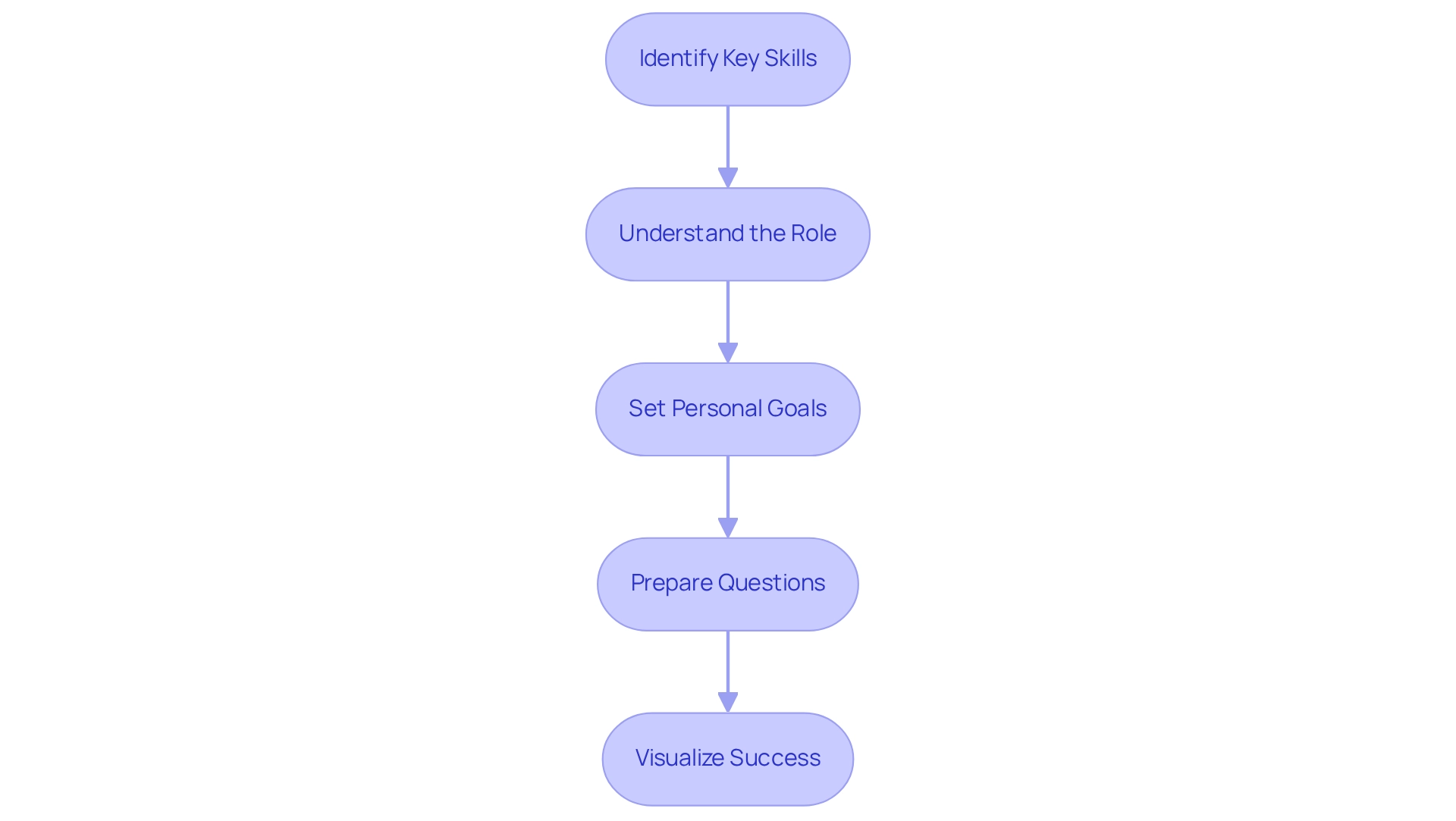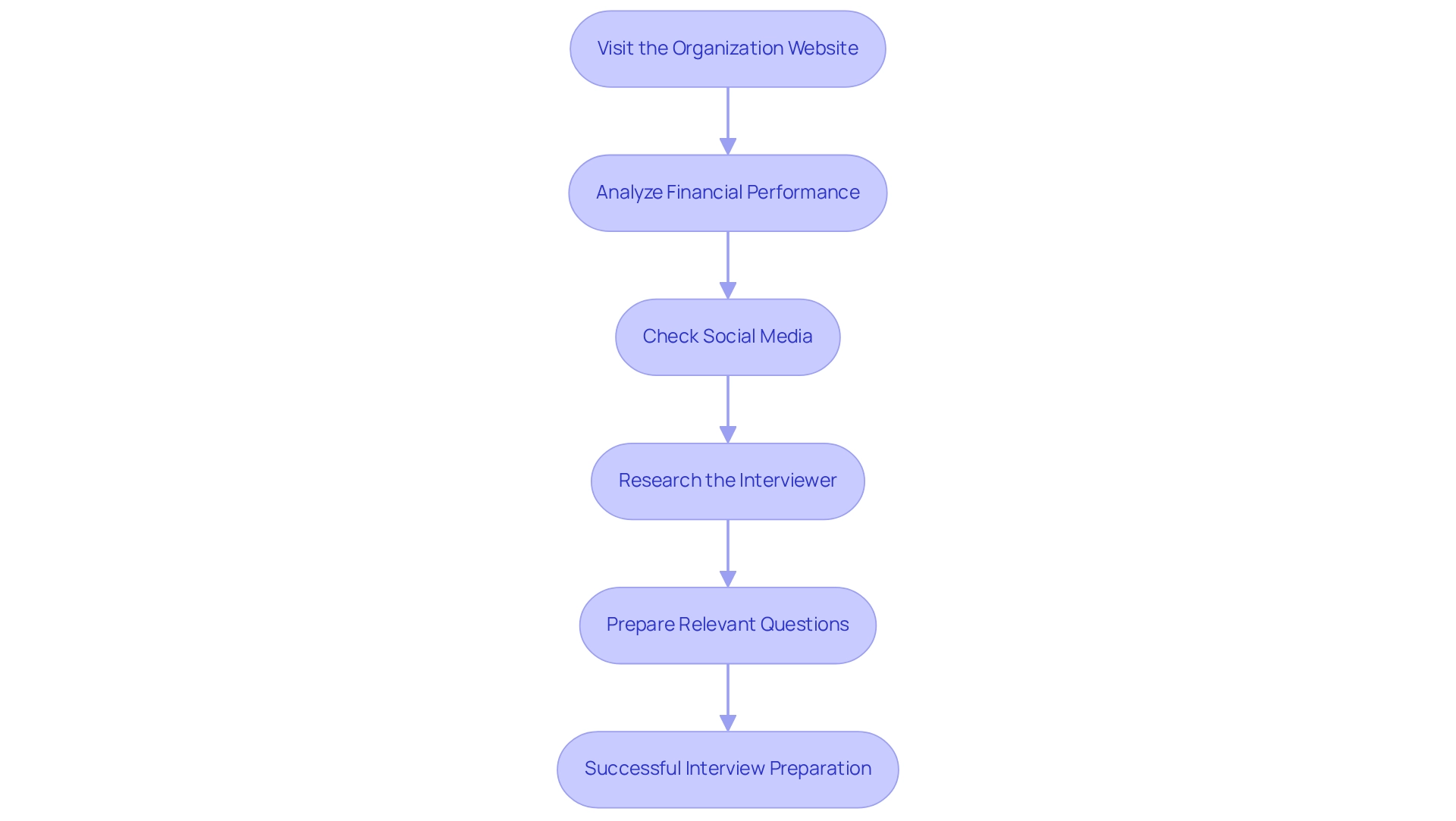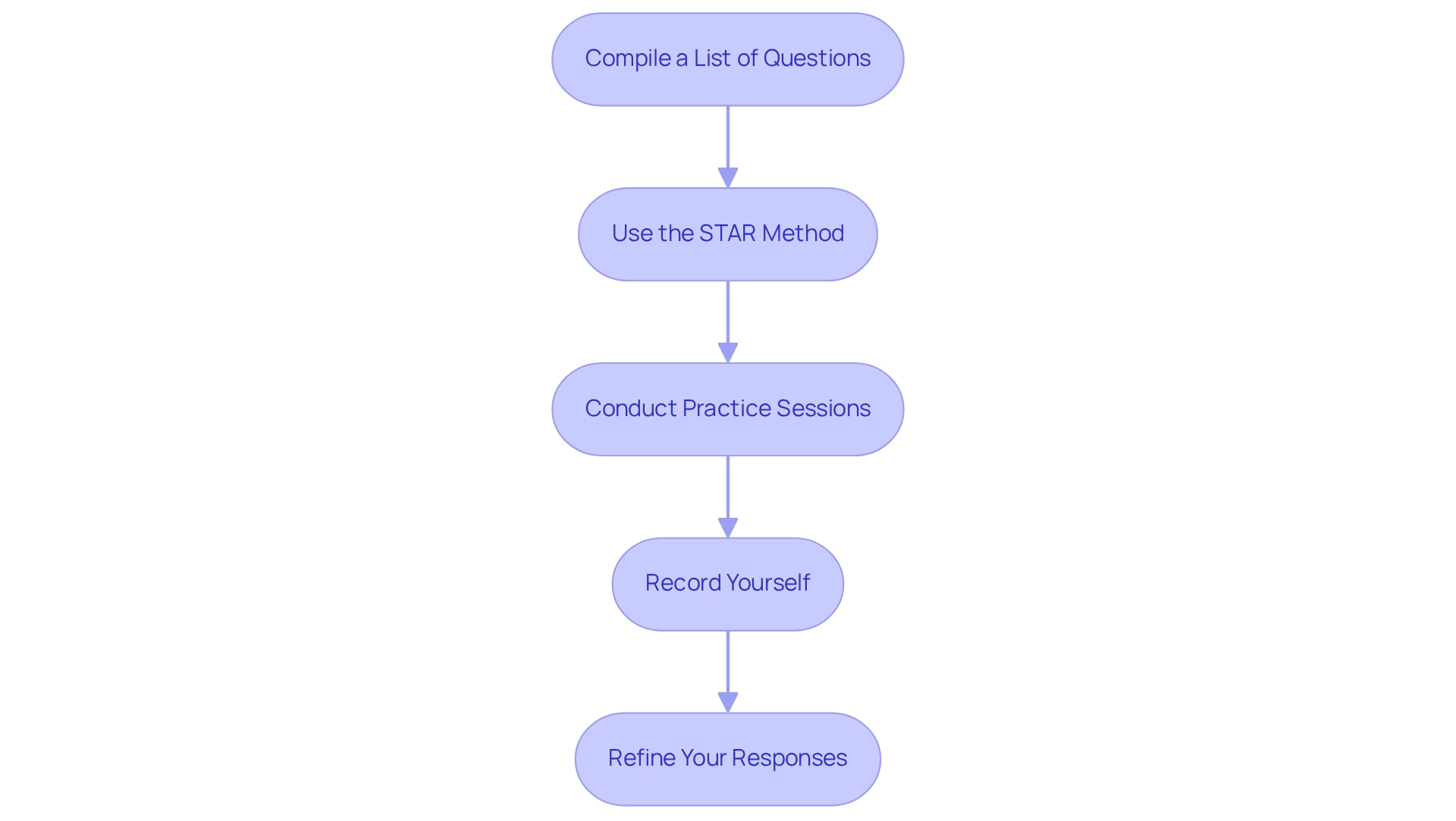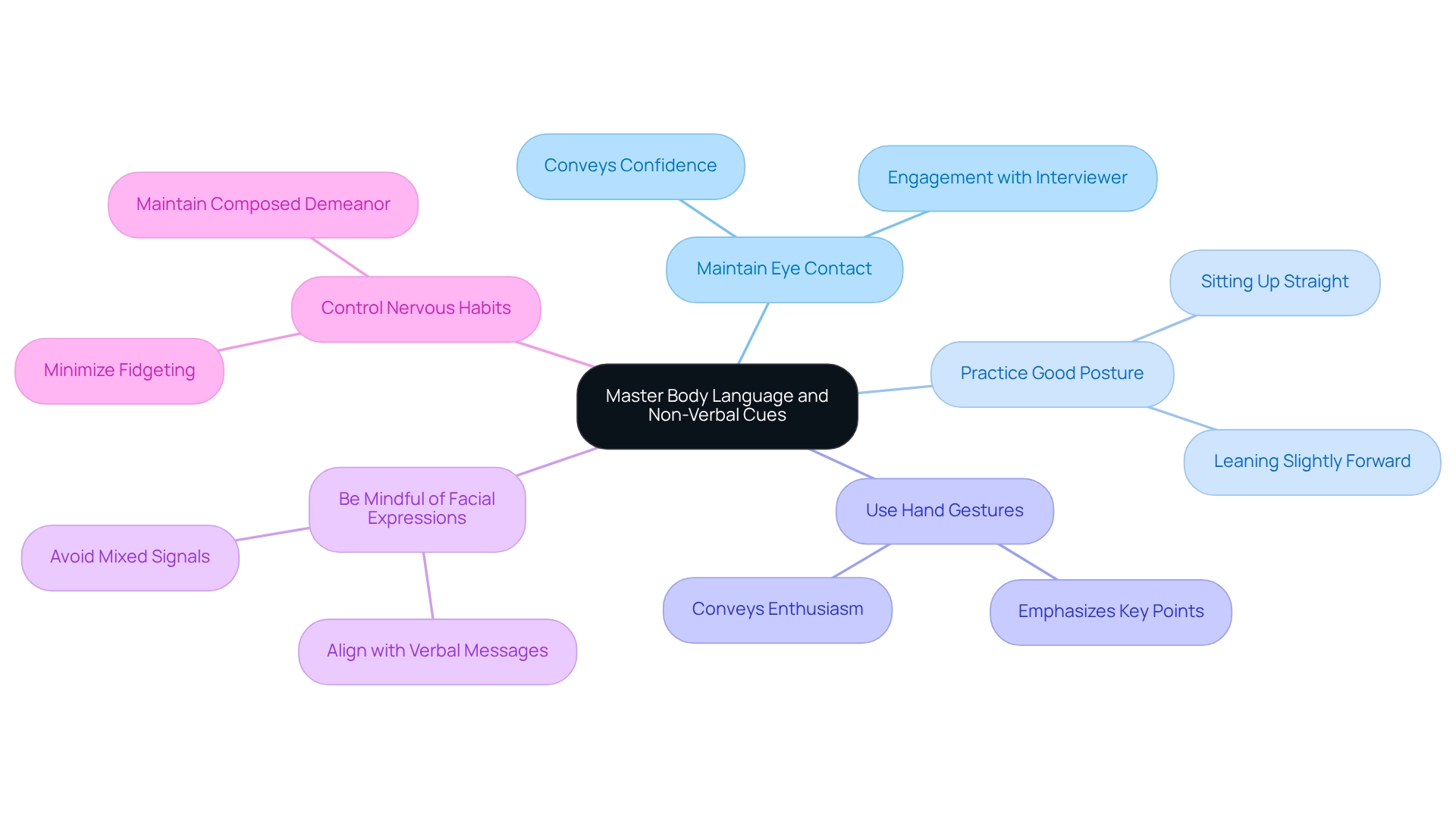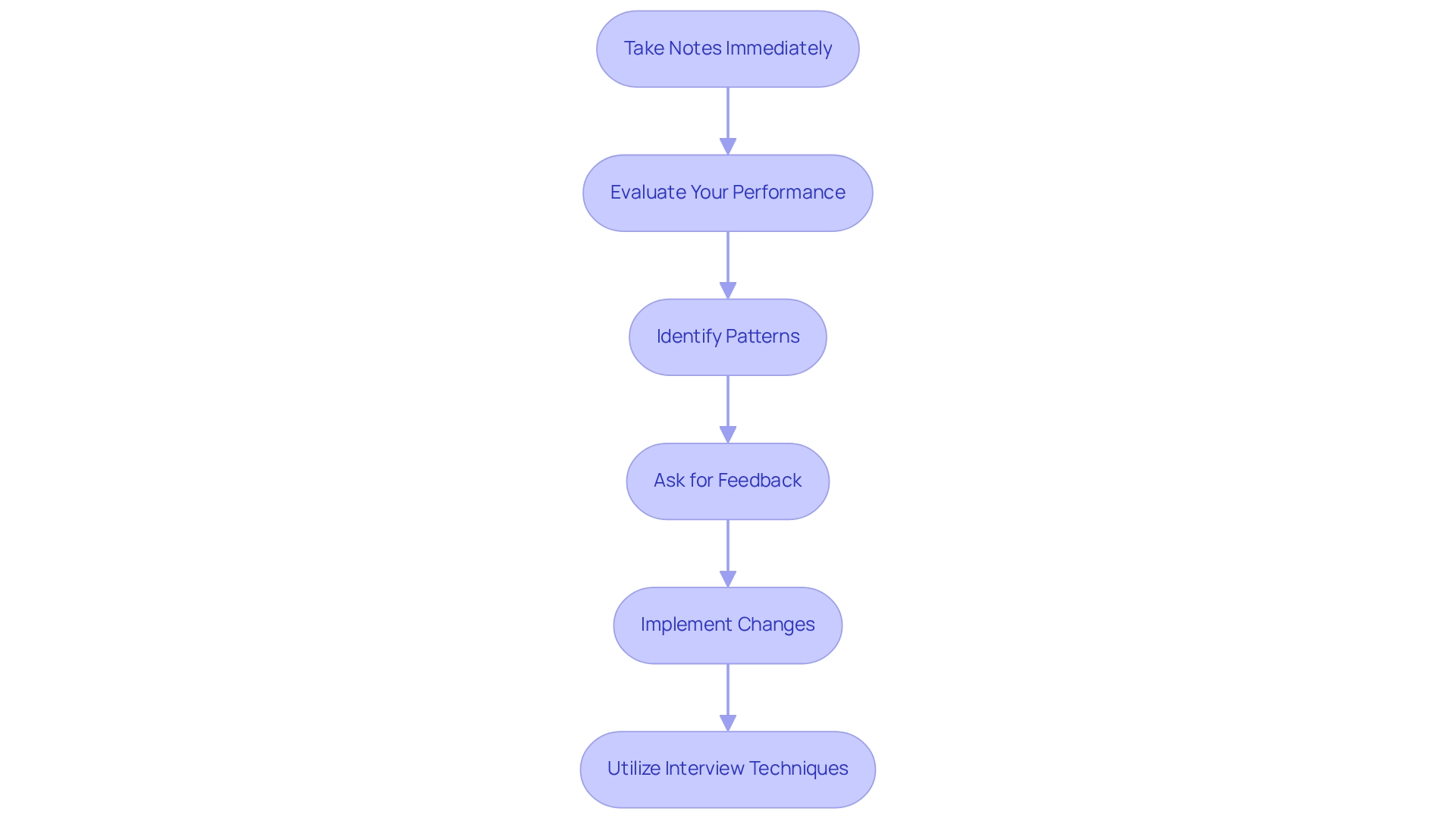Overview
To excel in interviews within the competitive landscape of financial firms, candidates must:
- Establish clear objectives
- Conduct comprehensive research on the organization and interviewer
- Practice common questions through structured methodologies like the STAR technique
This approach not only prepares candidates effectively but also aligns them with employer expectations. Practical strategies, such as:
- Formulating thoughtful questions
- Exhibiting effective body language
- Soliciting feedback post-interview
significantly enhance performance. By adopting these methods, candidates can position themselves as strong contenders in a challenging job market.
Key Highlights:
- Establish clear interview objectives to improve skills and align with employer needs.
- Identify key skills and understand the role by reviewing the job description carefully.
- Prepare thoughtful questions to gauge company culture and growth opportunities.
- Conduct thorough research on the organization, including its mission, values, and financial performance.
- Utilize LinkedIn to learn about the interviewer and tailor your conversation accordingly.
- Practice common interview questions using the STAR method for structured responses.
- Engage in mock interviews and record practice sessions to refine delivery and body language.
- Maintain eye contact, good posture, and appropriate hand gestures to convey confidence.
- Reflect on interview performance immediately after, taking notes to capture insights.
- Seek constructive feedback from interviewers to identify areas for improvement.
- Implement changes based on feedback to enhance future interview performance.
Introduction
In the fiercely competitive landscape of finance, mastering the art of interviewing is not just beneficial; it is essential for candidates striving to secure their dream roles. The interview process transcends the mere act of answering questions; it requires strategic preparation, insightful research, and effective communication.
By defining clear objectives and understanding company culture, alongside practicing common interview questions and refining body language, each step becomes pivotal in shaping a candidate’s success. Moreover, reflecting on performance and seeking feedback after interviews can yield invaluable insights for continuous improvement.
This comprehensive guide delves into the key strategies that empower candidates to navigate the interview process with confidence and poise, ultimately unlocking greater career opportunities.
Define Your Interview Objectives
Establishing your objectives for the meeting is vital for success in the recruitment process. Start by reflecting on how to improve interview skills and what you aim to achieve during the interview. Here are essential steps to guide you:
- Identify Key Skills: Create a list of skills and experiences that align with the position you are applying for, ensuring they resonate with the employer’s needs.
- Understand the Role: Thoroughly review the job description to identify the key attributes and qualifications the employer prioritizes in candidates.
- Set personal goals that include how to improve interview skills, such as enhancing your confidence or gaining insights into the organizational culture, which can significantly impact your performance.
- Prepare Questions: Develop thoughtful questions that reflect your objectives, focusing on aspects like team dynamics and growth opportunities within the organization. This is a chance to gauge how well the company aligns with your career aspirations and values.
- Visualize Success: Envision yourself achieving your goals during the meeting. This mental preparation can alleviate anxiety and enhance your overall performance.
Establishing short-term career objectives, preferably within a six-month period, can provide a systematic method for your preparation. This aligns with the broader strategy of effective recruitment that Boutique Recruiting advocates, as they address the challenge of finding the right talent for employers. As applicants navigate the job market, they should remember that the first job offer may not always be the best. Exploring multiple opportunities can reveal roles that better align with their long-term aspirations. As Seneca wisely noted, “Luck is what happens when preparation meets opportunity,” underscoring the importance of being well-prepared to seize the right opportunities in your career. Additionally, career coaches emphasize that understanding how to improve interview skills through setting clear interview goals not only enhances your performance but also aligns your aspirations with the needs of potential employers, making you a more attractive candidate.
Research the Company and Interviewer
To effectively investigate the organization and interviewer, consider the following steps:
-
Visit the Organization Website: Familiarize yourself with the organization’s mission, values, and recent news. Understanding these elements is crucial, as 71% of organizations provide inclusive and constructive feedback. Candidates can leverage this feedback during their preparation, ensuring their responses align with the organization’s values.
-
Analyze Financial Performance: For financial firms, reviewing financial reports and market position is essential. This knowledge not only demonstrates your interest but also helps you grasp their business model, significantly impacting your interview success.
-
Check Social Media: Explore the company’s social media profiles to assess their culture and recent initiatives. With 70% of employers utilizing social media to screen candidates, showcasing your awareness of their online presence can distinguish you from others. Consider enhancing your own social media profiles to reflect your professional brand positively, as this can influence how interviewers perceive you.
-
Research the Interviewer: Utilize LinkedIn to learn about the interviewer’s background, role, and interests. This insight can help you identify common ground and tailor your conversation, making a positive impression. Furthermore, during the meeting, be prepared to discuss your workstyle preferences, salary expectations, and any unique personal situations that may affect your suitability for the position. Transparency about your motivations and expectations can foster trust with the interviewer.
-
Prepare Relevant Questions: Based on your research, formulate insightful questions that demonstrate your interest in the organization and the role. Engaging with the interviewers on topics pertinent to their culture and values can enhance your candidacy. Remember, sharing personal insights that relate your experiences to the position can strengthen the connection and showcase your authenticity.
Understanding organizational culture is particularly vital in finance discussions, as firms increasingly prioritize candidates who resonate with their values. As highlighted by industry leaders, adjusting your strategy based on company research can significantly improve your outcomes, especially in a competitive environment where 99% of Fortune 500 firms utilize Applicant Tracking Systems. Additionally, with 86% of organizations employing new virtual technology for discussions, being prepared for this format is essential. By following these steps, you can navigate the hiring process more effectively and position yourself as a strong candidate.
Practice Common Interview Questions
To effectively practice common questioning techniques, consider implementing the following strategies:
-
Compile a List of Questions: Begin by assembling a comprehensive list of frequently asked finance job questions. Concentrate on areas such as your experience, skills, and situational responses that are pertinent to the finance sector in 2025.
-
Use the STAR Method: Structure your answers using the Situation, Task, Action, Result (STAR) framework. This method not only organizes your thoughts but also ensures that your responses are clear and impactful. Career experts suggest that concluding STAR answers on a positive note can significantly enhance the impression you leave on interviewers. Candidates should aim to create memorable STAR answers that resonate well with interviewers.
-
Conduct Practice Sessions: Engage in practice sessions with a friend or mentor who can provide constructive feedback. This practice allows you to simulate the questioning setting and improve your delivery. Including expert tips on practicing common finance questions during these sessions can further enhance your preparation.
-
Record Yourself: Recording your practice sessions can be invaluable. It enables you to assess your body language, tone, and overall presentation, helping you identify areas for improvement.
-
Refine Your Responses: After practicing, take the time to refine your answers based on the feedback received and your self-assessment. This iterative process will enhance the clarity and impact of your responses, boosting your confidence during real discussions.
By concentrating on these strategies, candidates can understand how to improve interview skills for discussions, making them more competitive in the finance job market. Maintaining a positive attitude throughout the selection process, even when discussing challenges, is crucial, as it resonates well with employers and showcases resilience. In fact, a positive mindset can result in a 20% rise in customer satisfaction, emphasizing the significance of effective communication abilities during discussions.
Master Body Language and Non-Verbal Cues
To effectively master body language and non-verbal cues during interviews, consider the following strategies:
- Maintain Eye Contact: Establishing eye contact is crucial as it conveys confidence and engagement, making a strong impression on interviewers.
- Practice Good Posture: Sitting up straight and leaning slightly forward demonstrates interest and attentiveness, signaling your enthusiasm for the role.
- Use Hand Gestures: Appropriate hand gestures can emphasize key points and convey enthusiasm, enhancing your verbal communication.
- Be Mindful of Facial Expressions: Ensure your facial expressions align with your verbal messages to avoid sending mixed signals, which can confuse interviewers.
- Control Nervous Habits: Identify and minimize any nervous habits, such as fidgeting or playing with your hair, to maintain a composed and professional demeanor.
Statistics indicate that effective communication comprises 20% knowledge and 80% how you feel about that knowledge, underscoring the significance of non-verbal cues. In the competitive finance sector, where first impressions are paramount, mastering body language can distinguish applicants. As LaMarcus Aldridge noted, “I can’t just tell the guys I want the ball, I have to do it with my body language,” highlighting the critical role of non-verbal communication in conveying intent and confidence. Experts emphasize that non-verbal communication can greatly influence selection results, especially in finance positions where hiring choices frequently depend on individuals’ capacity to convey professionalism and confidence. By concentrating on these elements, candidates can enhance their interview skills and significantly boost their likelihood of success.
Reflect and Seek Feedback After Interviews
To effectively reflect on and seek feedback after discussions, consider the following steps:
-
Take Notes Immediately: Document your thoughts and feelings about the interview while the experience is still fresh. This practice not only assists memory retention but also boosts your confidence; individuals report feeling more self-assured when interviewers take notes. Remember, leading prospects are assessing your organization just as you are assessing them.
-
Evaluate Your Performance: Critically assess your responses, body language, and overall demeanor during the discussion. This self-assessment is essential for recognizing strengths and weaknesses, particularly as candidates seek guidance on how to improve interview skills during the assessment process.
-
Identify Patterns: Examine your performance across various discussions to uncover recurring themes. Recognizing these patterns can help you pinpoint specific areas that require improvement, which is crucial for understanding how to improve interview skills and ensuring that your interview process remains attractive to high-caliber candidates.
-
Ask for Feedback: Proactively reach out to the interviewer or recruiter to request constructive feedback. As HR professional Heather Anderson advises, ensure you understand the company’s policy on recording devices and obtain consent if necessary. This approach not only demonstrates your commitment to growth but also fosters a positive impression. It is essential to clarify that feedback can be sought on various aspects of the discussion, including your responses and overall presentation.
-
Implement Changes: Use the feedback received to refine your preparation and approach for upcoming discussions. Concentrate on the aspects emphasized for enhancement, which can greatly improve your performance in future discussions and provide insights on how to improve interview skills to help you distinguish yourself in a competitive talent market.
Moreover, tailored follow-up messages can strengthen your suitability for the role. A case study demonstrates this: an applicant who initially struggled to express her qualifications secured a job after sending a thoughtful follow-up email that clarified her interest and qualifications. This not only made her unforgettable but resulted in her acceptance to a prestigious design school, highlighting the significance of personalized communication during the evaluation process.
Integrating these strategies into your evaluation process can lead to ongoing enhancement and career advancement, making you a more competitive applicant in the finance sector. Consider also utilizing various interview techniques such as situational, technical, and virtual interviews to further enhance your preparation and reflection.
Conclusion
Defining clear objectives and thoroughly researching potential employers are foundational steps in preparing for an interview in the finance sector. Candidates must focus on identifying key skills, understanding the role, and setting personal goals to align their aspirations with the needs of the employer. Thoughtful preparation, including crafting insightful questions, can significantly enhance the interview experience and demonstrate genuine interest.
Practicing common interview questions using structured methods like the STAR technique, along with engaging in mock interviews, refines responses and builds confidence. Additionally, mastering body language and non-verbal cues is essential, as these elements play a critical role in conveying professionalism and confidence during interviews.
After each interview, reflecting on performance and seeking constructive feedback are vital for continuous improvement. By documenting experiences and identifying patterns, candidates can enhance their future interview strategies. This iterative process not only boosts confidence but also helps candidates present themselves as more attractive prospects in a competitive job market.
Ultimately, mastering the art of interviewing in finance requires a combination of strategic preparation, effective communication, and a commitment to self-improvement. By embracing these strategies, candidates can navigate the interview process with confidence, paving the way for greater career opportunities in the dynamic world of finance. Are you ready to elevate your interview skills? Reach out for tailored guidance that aligns with your career aspirations.
Frequently Asked Questions
Why is establishing objectives for a meeting important in the recruitment process?
Establishing objectives is vital for success as it helps improve interview skills and clarifies what you aim to achieve during the interview.
What are the essential steps to guide in setting objectives for a recruitment meeting?
The essential steps include identifying key skills, understanding the role, setting personal goals, preparing questions, and visualizing success.
How can I identify key skills for the position I am applying for?
Create a list of skills and experiences that align with the position, ensuring they resonate with the employer’s needs.
What should I do to understand the role I am applying for?
Thoroughly review the job description to identify key attributes and qualifications prioritized by the employer.
What personal goals should I set for improving my interview skills?
Personal goals may include enhancing your confidence and gaining insights into the organizational culture, which can impact your performance.
What type of questions should I prepare for the interview?
Develop thoughtful questions focusing on team dynamics and growth opportunities within the organization to gauge alignment with your career aspirations.
How can visualizing success help in the interview process?
Envisioning yourself achieving your goals during the meeting can alleviate anxiety and enhance your overall performance.
How can establishing short-term career objectives assist in the preparation for interviews?
Setting short-term career objectives, preferably within a six-month period, provides a systematic method for preparation aligned with effective recruitment strategies.
What should candidates consider when exploring job opportunities?
Candidates should remember that the first job offer may not always be the best and exploring multiple opportunities can reveal roles that better align with long-term aspirations.
What are some steps to effectively investigate the organization and interviewer before an interview?
Steps include visiting the organization’s website, analyzing financial performance, checking social media, researching the interviewer, and preparing relevant questions.
Why is it important to understand the organization’s mission and values?
Understanding the organization’s mission and values is crucial as it allows candidates to align their responses during the interview, enhancing their candidacy.
How can researching the interviewer benefit my interview performance?
Learning about the interviewer’s background, role, and interests can help identify common ground and tailor your conversation, making a positive impression.
What should I do regarding my social media presence before an interview?
Explore the company’s social media profiles and enhance your own to reflect a positive professional brand, as many employers utilize social media to screen candidates.
What is the significance of preparing relevant questions based on research?
Formulating insightful questions demonstrates your interest in the organization and the role, enhancing your candidacy and showcasing authenticity.
